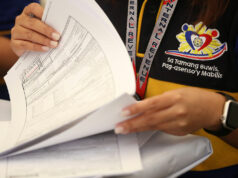Goat cheese could be next big venture for Malagos group
By Maya M. Padillo
Correspondent
DAVAO CITY — It started with three goats — named Marvin, Jolina, and Rica after celebrities from the mid-1990s — but later became a sizeable collection of ruminants maintained by her veterinarian husband.
Olive O. Puentespina, a member of the family behind the Malagos AgriVentures Group, initially bottled fresh goat’s milk to sell, but the enterprise did not take off.
So her thoughts turned to how to preserve the milk — and the idea for Malagos artisanal cheese was born.
“My cheese journey — getting educated in dairying and cheese making — has brought me to the US, Mongolia, Canada, Switzerland, Italy. And each time I travel, I learn more,” Ms. Puentespina said in an interview.
She said the transformation of milk into cheese involves “science, cooking and adventure.”
A graduate of the University of the Philippines Los Baños (UPLB) who worked at the university’s Dairy Training and Research Institute, she later took lessons from a colleague, then from two Swiss cheese masters from Pontresina, and classes in San Francisco.
In 2008, Ms. Puentespina officially started producing cheese under the Malagos Farmhouse brand, which is now served in various hotels and restaurants in the country, and even during state dinners.
“I think I started European-style artisanal cheese making in the Philippines. I am proud that the cheeses I make are on the top tables of the best hotels, restaurants and resorts and airline in the Philippines. That is more than what I can ask for,” she said.
Malagos Farmhouse, with a GMP (Good Manufacturing Practice) certification from the Food and Drug Administration, has developed and sells over 25 cheese varieties.
“From 30 liters of milk production, now we make cheese from two to three tons of milk a week, all handmade and distributed to over 80 establishments in the country, albeit in small quantities,” she narrates.
Does she have a favorite cheese? No, she says, because that would be like playing favorites among what she considers her children.
“My day as a mom, a wife and cheesemaker starts early. After the household duties, I enter the cheese room and focus on the day’s work. I check what cheeses are to be shipped and produced, then enter to the aging room and manage my cheeses, go through about 200 wheels of cheese. When the cheese making starts, no one can disturb me until I am done. Around 5 p.m, I can accept private tasting sessions on cheese appreciation, and be home by 7 p.m for motherly and wifely duties,” she said.
“I also get to enjoy some personal time with friends without the cheeses, but I also get asked about them, like asking, ‘how are the kids?” she added.
Her daughter Ingrid, who is currently taking up Food Tech in UP Diliman, is being groomed to take over operations when she graduates.
She is a “working student” now and takes cheese-making lessons during school breaks.
“Now that my kids are practically adults needing less of my supervision, I get to perfect my craft. I get to travel to educate myself more and get to market my product, too. So yes, I probably have no life outside of the cheese room, but I am having so much fun,” said Ms. Puentespina.
And Ms. Puentespina said part of living her life is not having to wear a dress.
She will only wear one, she said, when she and her husband, Dr. Roberto P. Puentespina Jr., renew their marriage vows in the future.



